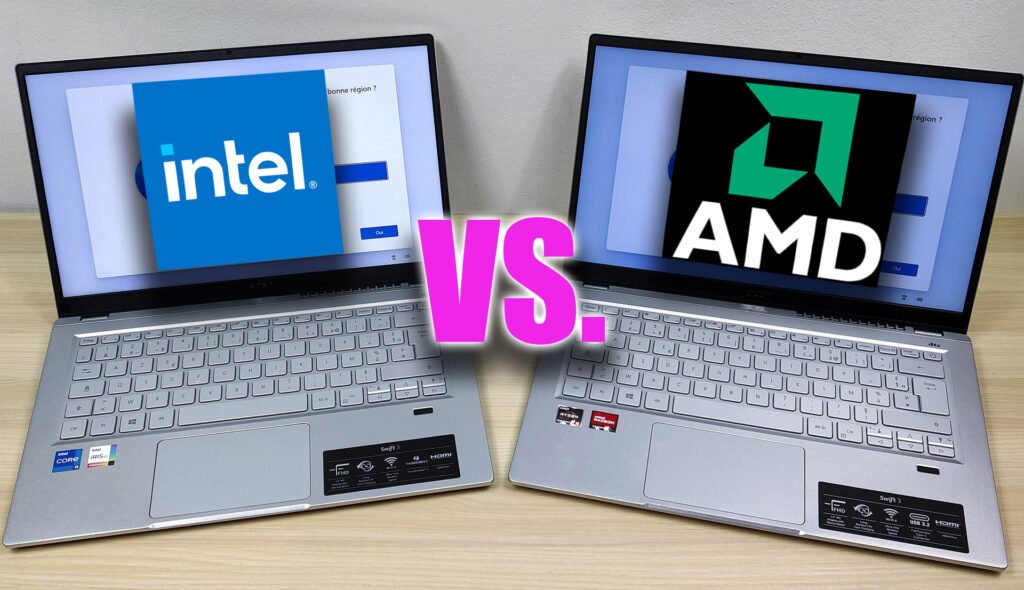When choosing a laptop, one of the most crucial decisions you’ll face is whether to go with an Intel or AMD processor. Both brands offer powerful processors with unique features, and your choice can significantly impact your computing experience. In this blog, we’ll delve into the key differences between Intel vs AMD laptops and help you determine which one might be the best fit for your needs.
Performance: Intel vs AMD Laptops
Intel Laptops:
- Processor Generations: Intel offers a range of processors, from the budget-friendly Intel Core i3 to the high-performance Intel Core i9. The latest generations, such as Intel’s 13th Gen, provide substantial improvements in speed and efficiency.
- Single-Core Performance: Intel processors are known for their strong single-core performance, which makes them excellent for tasks requiring high clock speeds, such as gaming and software development.
- Thermal Management: Intel’s processors often feature advanced thermal management, which helps keep the laptop cool and prevents overheating during intensive tasks.
AMD Laptops:
- Ryzen Processors: AMD’s Ryzen processors have gained significant popularity due to their competitive performance and affordability. The Ryzen 5000 series, for instance, offers impressive multi-core performance.
- Multi-Core Performance: AMD processors excel in multi-core performance, which is advantageous for tasks that utilize multiple cores, such as video editing and 3D rendering.
- Value for Money: AMD laptops often provide better value for money, offering similar or better performance compared to Intel counterparts at a lower price point.
Battery Life: Intel vs AMD Laptops
Intel Laptops:
- Power Efficiency: Intel processors generally offer good power efficiency, which translates to longer battery life. Technologies like Intel’s Turbo Boost and Advanced Power Management contribute to optimizing battery usage.
- Optimized for Ultraportables: Many Intel processors are designed with ultraportable laptops in mind, offering a balance between performance and battery longevity.
AMD Laptops:
- Battery Efficiency: AMD has made strides in improving battery efficiency, but traditionally, Intel processors have had the edge in this area. However, the gap is narrowing with newer AMD Ryzen processors.
- Power Consumption: AMD’s approach to power consumption has improved, and recent models show competitive battery life compared to Intel laptops.
Graphics: Intel vs AMD Laptops
Intel Laptops:
- Integrated Graphics: Intel processors come with integrated graphics, such as Intel Iris Xe, which are suitable for everyday tasks and light gaming. However, for more demanding graphics tasks, a dedicated GPU is recommended.
- Graphics Options: Intel laptops often provide a range of options for integrated graphics, making them versatile for various needs.
AMD Laptops:
- Radeon Graphics: AMD’s Ryzen processors often come with Radeon Vega graphics, which offer better performance compared to Intel’s integrated options. This is especially beneficial for gaming and graphic-intensive applications.
- Dedicated Graphics: Many AMD laptops are equipped with dedicated Radeon GPUs, providing superior graphics performance compared to Intel-integrated solutions.
Price and Value: Intel vs AMD Laptops
Intel Laptops:
- Premium Pricing: Intel laptops are often priced higher due to the premium nature of Intel’s processors. This pricing reflects the high performance and advanced technology embedded in these processors.
- Brand Recognition: Intel’s long-standing reputation for quality and performance can justify the higher price for many consumers.
AMD Laptops:
- Cost-Effective Solutions: AMD laptops are generally more cost-effective, providing competitive performance at a lower price. This makes them an attractive choice for budget-conscious buyers.
- Value Proposition: With the performance improvements in recent AMD processors, you get a strong value proposition without compromising on quality.
Compatibility and Ecosystem: Intel vs AMD Laptops
Intel Laptops:
- Wider Compatibility: Intel processors benefit from a broader ecosystem with extensive support for various software and hardware configurations.
- Brand Ecosystem: Intel’s well-established ecosystem includes a range of compatible peripherals and accessories.
AMD Laptops:
- Growing Ecosystem: While AMD’s ecosystem has been growing, it may not be as extensive as Intel’s. However, AMD laptops are becoming increasingly compatible with a wide range of software and peripherals.
- Future-Proofing: AMD’s commitment to innovation ensures that their laptops are becoming more compatible with future technologies.
User Experience: Intel vs AMD Laptops
Intel Laptops:
- Stability and Reliability: Intel processors are known for their stability and reliability, making them a preferred choice for professional environments where consistent performance is crucial.
- Software Optimization: Many software applications are optimized for Intel processors, ensuring a smooth and efficient user experience.
AMD Laptops:
- Performance Gains: AMD’s continuous improvements in processor technology offer users excellent performance gains, particularly in applications that benefit from multiple cores.
- Increasing Popularity: As AMD gains popularity, more software developers are optimizing their applications for AMD processors, enhancing the overall user experience.
Conclusion
Choosing between Intel vs AMD laptops ultimately depends on your specific needs and budget. Intel laptops are renowned for their strong single-core performance and efficiency, making them ideal for high-performance tasks. On the other hand, AMD laptops offer excellent multi-core performance and value for money, making them a compelling choice for those looking for powerful performance without breaking the bank.
By considering factors such as performance, battery life, graphics, price, and compatibility, you can make an informed decision that best suits your requirements. Whether you opt for Intel or AMD, both brands offer impressive laptops that cater to a wide range of needs and preferences.





I am extremely inspired together with your writing skills as neatly as with the layout in your weblog. Is that this a paid theme or did you modify it yourself? Anyway keep up the excellent quality writing, it’s uncommon to look a great blog like this one these days!
hgh 4iu
References:
how much hgh to take a Day for bodybuilding (ebra.ewaucu.us)
hgh booster
References:
Hgh Cycle For Muscle Gain [Enoticias.Space]
hgh wirkungseintritt
References:
wehrle
anabolic steroids stacks for sale
References:
Valley.md